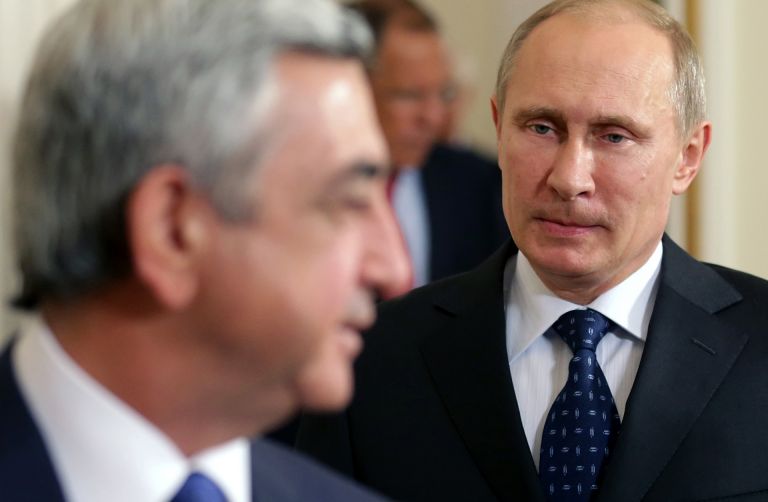The Constitutional Court of the Republic of Armenia, by examining the protocols, made a decision stating that they were in conformity with the Constitution. But, they linked this to the protocols being consistent with legal positions set forth in this Decision. In the Court’s decision, many of the provisions of the protocols are being reviewed and several interpretations are being put forth. Since the decision is a whole, these interpretations are binding; in other words, they cannot be altered and have to be implemented as it is. However, some of these interpretations are contradictory to both the content and the spirit of the protocols and even changes the meaning of some articles. By referring to the Declaration of Independence of Armenia which is mentioned in the Preamble of Armenia’s Constitution, it has been stated that the provisions of the protocol cannot be interpreted or applied in a way that would contradict paragraph 11 of this Declaration. Paragraph 11 states the following: The Republic of Armenia stands in support of the task of achieving international recognition of the 1915 Armenian genocide in Ottoman Turkey and Western Armenia. From this paragraph, we can draw two conclusions. The first is that Armenia must make every effort to achieve recognition of the genocide allegations. Since genocide is accepted as a reality, it will not be possible to discuss whether the 1915 events are genocide or not in the Sub-commission on the Historical Dimension mentioned in the Second Protocol. Therefore, the question arises of what this Sub-commission’s task will be. In response, it has been expressed that its task will include the discussion of issues like returning back of Armenian properties left behind after the Armenian relocation, giving compensation to descendants of the relocated Armenians, and preserving Armenian monuments, such as churches, in Turkey. Turkey is not willing to re-examine these issues which have already been resolved with the Treaty of Lausanne. The second conclusion is that the statement of Western Armenia mentioned in paragraph 11 actually refers to Eastern Anatolia. By putting forth that some of the Turkish lands are in fact Armenian, Armenia indirectly claims a right over these territories. In other words, again indirectly, it does not recognize the border between the two countries. However, in the First Protocol, the recognition of the existing border between the two countries is confirmed. In the Constitutional Decision, this recognition is connected to safeguarding the normal operations of border checkpoints. Thus, the border has been recognized only to carry out checkpoint operations. This recognition is an operational one and does not mean that Turkey’s territorial integrity is recognized. In other words, by asserting that they have historical rights, in the future, Armenia will be able to demand territory from Turkey just at a time when they see suitable. On the other hand, it is stated in the decision of the Court that the commitments assumed within the framework of the protocols have a bilateral content exclusively and they cannot relate under any pretext with some third party. This way, it has been expressed that the protocols will not in any way be related to the Karabakh conflict. In fact, in the protocols, there is no direct reference to Karabakh. However, the statements in the Second Protocol regarding the cooperation for enhancing regional stability and security of the region and commitment of the two countries to the peaceful settlement of regional and international disputes and conflicts on the basis of norms and principles of international law are indirectly linked to Karabakh. But, the Constitutional Court has not touched upon these subjects at all. According to the decision of the Constitutional Court, two main items exist in the protocols which should be implemented. The first is the opening of the borders; the second is the establishment of diplomatic relations. Since 1992, Armenian governments raised these points against Turkey. However, the Turkish governments have linked the implementation of these two items to the recognition of the existing border (or recognition of each other’s territorial integrity) and the scholarly examination of the genocide allegations. About 17 years later, Armenia has accepted the Turkish demands and has signed the protocols. But now, the decision of the Constitutional Court will prevent Armenia to recognize the territorial integrity of Turkey and the examination of the genocide allegations, and the protocols could not be considered anymore as an important instrument for the normalization of relations of the two countries. In conclusion, there has been a retreat to the very beginning of the Turkey-Armenia normalization process, in other words, to point zero. We will continue this subject later on.
© 2009-2025 Center for Eurasian Studies (AVİM) All Rights Reserved
THE DRAFT RESOLUTION IN THE US REGARDING THE CHURCHES AND PROPERTIES IN TURKEY AND THE TURKISH REPUBLIC OF NORTHERN CYPRUS
THE PERINÇEK CASE
JOACHIM GAUCK AND TURKEY
THE DECLARATION REGARDING ARMENIAN GENOCIDE ALLEGATIONS - Ömer Engin LÜTEM
 APEC LIMA SUMMIT
APEC LIMA SUMMIT
 WHAT FUTURE FOR ARMENIAN-RUSSIAN RELATIONS?
WHAT FUTURE FOR ARMENIAN-RUSSIAN RELATIONS?




























